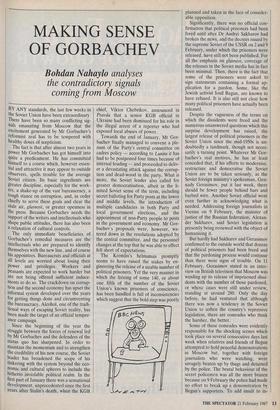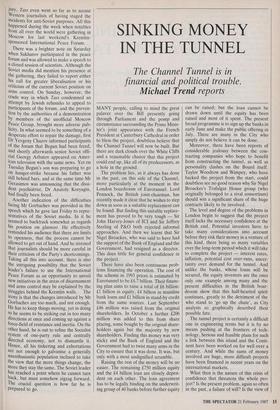MAKING SENSE OF GORBACHEV
Bohdan Nahaylo analyses
the contradictory signals coming from Moscow
BY ANY standards, the last few weeks in the Soviet Union have been extraordinary. There have been so many conflicting sig- nals emanating from Moscow that the excitement generated by Mr Gorbachev's reformist zeal has to be tempered with healthy doses of scepticism.
The fact is that after almost two years in Power Mr Gorbachev has got himself into quite a predicament. He has committed himself to a course which, however essen- tial and attractive it may appear to outside observers, spells trouble for .the average Soviet citizen. Its basic ingredients are greater discipline, especially for the work- ers, a shake-up of the vast bureaucracy, a tough stance on corruption, and, in order chiefly to serve these goals and clear the stale air, glasnost, or greater openness in the press. Because Gorbachev needs the support of the writers and intellectuals who shape public attitudes, there has also been a relaxation of cultural controls.
The only immediate beneficiaries of Gorbachev's remedial measures are the intellectuals who are prepared to identify themselves with the new line, and of course his appointees. Bureaucrats and officials at all levels are worried about losing their Power and privileges. Workers and peasants are expected to work harder but are not being offered sufficient induce- ments to do so. The crackdown on corrup- tion and the second economy has upset the informal system developed over the years for getting things done and circumventing the bureaucracy. Alcohol, one of the tradi- tional ways of escaping Soviet reality, has been made the target of an official temper- ance campaign.
Since the beginning of the year the struggle between the forces of renewal led by Mr Gorbachev and the defenders of the status quo has sharpened. In order to maintain the momentum and to strengthen the credibility of his new course, the Soviet leader has broadened the scope of his tinkering with the system beyond the eco- nomic and cultural spheres to include the hitherto inviolable political realm. In the first part of January there was a sensational development, unprecedented since the first years after Stalin's death, when the KGB chief, Viktor Chebrikov, announced in Pravda that a senior KGB official in Ukraine had been dismissed for his role in the illegal arrest of a reporter who had exposed local abuses of power.
Towards the end of January, Mr Gor- bachev finally managed to convene a ple- num of the Party's central committee on cadres policy -- according to Lunita it has had to be postponed four times because of internal feuding — and proceeded to deliv- er a devastating attack against the corrup- tion and dead-wood in the party. What is more, the Soviet leader also 'called for greater democratisation, albeit in the li- mited Soviet sense of the term, including secret balloting for Party posts at the lower and middle levels, the introduction of multiple candidacies in both Party and local government elections, and the appointment Of non-Party people to posts in the government and economy. Mr Gor- bachev's proposals were, however, wa- tered down in the resolutions adopted by the central committee, and the personnel changes at the top that he was able to effect fell short of expectations.
The Kremlin's helmsman promptly seems to have raised the stakes by en- gineering the release of a sizable number of political prisoners. Yet the very manner in which the freeing of some 140, or about one fifth of the number of the Soviet Union's known prisoners of conscience, has been handled is full of inconsistencies which suggest that the bold step was poorly planned and taken in the face of consider- able opposition.
Significantly, there was no official con- firmation that political prisoners had been freed until after Dr Andrei Sakharov had broken the news, and the decrees issued by the supreme Soviet of the USSR on 2 and 9 February, under which the prisoners were released, have still not been published. For all the emphasis on glasnost, coverage of the releases in the Soviet media has in fact been minimal. Then, there is the fact that some of the prisoners were asked to sign statements containing a formal ap- plication for a pardon. Some, like the Jewish activist Iosif Begun, are known to have refused. It is also still not clear how many political prisoners have actually been released.
Despite the vagueness of the terms on which the dissidents were freed and the numerous unanswered questions which this surprise development has raised, the largest release of political prisoners in the Soviet Union since the mid-1950s is un- doubtedly a landmark, though not neces- sarily a turning point. Whatever Mr Gor- bachev's real motives, he has at least conceded that, if his efforts to modernise, restructure and democratise the Soviet Union are to be taken seriously, as the Soviet foreign ministry's spokesman, Gen- nady Gerasimov, put it last week, there should be fewer people behind bars and barbed wire. Another Soviet official went even further in acknowledging what is needed. Addressing foreign journalists in Vienna on 9 February, the minister of justice of the Russian federation, Alexan- der Sukharev, said Soviet legislation is presently being reviewed with the object of humanising it.
But hardly had Sukharev and Gerasimov confirmed to the outside world that dozens of political prisoners had been freed and that the pardoning process would continue than there were signs of trouble. On 11 February, Gerasimov stated in an inter- view on British television that Moscow was winding up its release of imprisoned dissi- dents with the number of those pardoned, or whose cases were still under review, standing at around 280. Only the day before, he had ventured that although there was now a tendency in the Soviet Union to soften the country's repressive legislation, there are comrades who think the harsher, the better.
Some of these comrades were evidently responsible for the shocking scenes which took place on several consecutive days last week when relatives and friends of Begun attempted to hold peaceful demonstrations in Moscow but, together with foreign journalists who were watching, were savagely beaten up by thugs and detained by the police. The brutal behaviour of the secret policemen was all the more brazen because on 9 February the police had made no effort to break up a demonstration by Begun's supporters. To add insult to in- jury, Toss even went so far as to accuse Western journalists of having staged the incidents for anti-Soviet purposes. All this happened during the week when notables from all over the world were gathering in Moscow for last weekend's Kremlin- sponsored International Peace Forum.
There was a brighter note on Saturday when Sakharov participated in the peace forum and was allowed to make a speech to a closed session of scientists. Although the Soviet media did mention his presence at the gathering, they failed to report either his call for greater liberalisation or his criticism of the current Soviet position on arms control. On Sunday, however, the crude way in which Tass condemned an attempt by Jewish refusniks to appeal to participants of the forum, and the preven- tion by the authorities of a demonstration by members of the unofficial Moscow Peace Group, brought more adverse pub- licity. In what seemed to be something of a desperate effort to repair the damage, first Dr Yevgeny Chazov informed participants of the forum that Begun had been freed, and shortly afterwards senior Soviet offi- cial Georgy Arbatov appeared on Amer- ican television with the same news. Yet on Tuesday Begun's son was preparing to go on hunger-strike because his father was still behind bars, and at the same time Mr Gerasimov was announcing that the dissi- dent psychiatrist, Dr Anatoly Koryagin, had finally been freed.
Another indication of the difficulties facing Mr Gorbachev was provided in the speech which he gave last Friday to repre- sentatives of the Soviet media. In it he seemed to backtrack somewhat as regards his position on glasnost. He effectively reminded his audience that there are limits to openness, that the process cannot be allowed to get out of hand. And he stressed that journalists should be more careful in their criticism of the Party's shortcomings. Taking all this into account, there is also the intriguing possibility that the Soviet leader's failure to use the International Peace Forum as an opportunity to unveil new initiatives in the areas of disarmament and arms control may be explained by the struggles behind the Kremlin walls. The irony is that the changes introduced by Mr Gorbachev are too much, and not enough. He has to keep things moving, yet in doing so he seems to be striking out in too many directions at once and coming up against a force-field of resistance and inertia. On the other hand, he is out to refine the Socialist system of one-party rule and centrally directed economy, not to dismantle it. Hence, all his tinkering and exhortations are not enough to galvanise a generally unenthusiastic population inclined to take the view that the more things change, the more they stay the same. The Soviet leader has reached a point where he cannot turn back, but must somehow zigzag forward. The crucial question is how far he is prepared to go.



















































 Previous page
Previous page